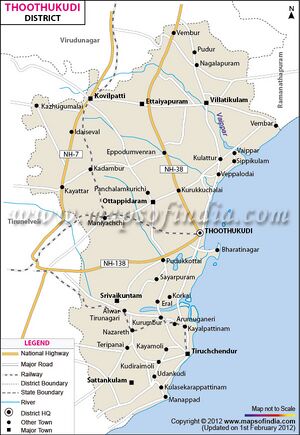Thoothukudi
| Author:Laxman Burdak, IFS (R) |

Thoothukudi (तूतुकुड़ी) (formerly Tuticorin) is a city and district of Tamil Nadu state in southern India.
Variants
- Thoothukudi (तूतुकुड़ी)
- Tuticorin (तूतिकोरिन)
Location
Thoothukudi (formerly Tuticorin) is a port city, a municipal corporation and an industrial city in Thoothukudi district in the Indian state of Tamil Nadu. The city lies in the Coromandel Coast of Bay of Bengal.
Thoothukudi district is situated in the south-eastern corner of Tamil Nadu. It is bounded by the districts of Virudhunagar on the north, Ramanathapuram on the north-east, Tirunelveli on the west and south-west, Tenkasi on the north-west and Gulf of Mannar on the east and southeast.
History
Thoothukudi is known as "Pearl City" due to the pearl fishing carried out in the town. It is a commercial seaport which serves the inland cities of Southern India and is one of the sea gateways of Tamil Nadu. It is also one of the major seaports in India with a history dating back to the 6th century CE. The city is believed to be of significant antiquity and has been ruled, at different times, by the Early Pandyas, Medieval Cholas, Later Cholas, Later Pandyas, Ma'bar Sultanate, Tirunelveli Sultanate, Vijayanagar Empire, Madurai Nayaks, Chanda Sahib, Carnatic kingdom, Portuguese, Dutch and the British. Thoothukudi was settled by the Portuguese, Dutch and later by the British East India Company.
The majority of the people of the city are employed in salt pans, sea-borne trading, fishing, and tourism. The 21 islands between Thoothukudi and Rameswaram shores in the Gulf of Mannar are noted as the first Marine Biosphere Reserve of India, and have around 36,000 species of flora and fauna. This protected area is called Gulf of Mannar Marine National Park. Our Lady of Snows Basilica festival is celebrated annually during August. This and the Shiva temple festivals, including Adi Amavasai, Sasti, and Chittirai chariot festivals, are the major festivals of the area. Roadways are the major mode of transport to Thoothukudi, while the city also has rail, air, and sea transport.
The district was formed by bifurcation of Tirunelveli district on 20 October 1986. Thoothukudi is the district headquarters and largest city of the district. The district is known for fishing as well as pearl cultivation, with an abundance of pearls being found in the seas offshore. Thoothukudi district has many historical sites such as Adichanallur and the ancient trade port of Korkai.[1] Thoothukudi is also known by the name 'Pearl city'. It is also called as "Sea Gateway of Tamil Nadu".[7] Thoothukudi is part of the Pearl Fishery Coast, and is known for its pearl fishing and shipbuilding industries.[8]
The ancient town of Korkai near present-day Thoothukudi has been a centre for maritime trade and pearl fishery for more than 2000 years. Ptolemy's geography refers to Korkai as a centre of pearl fishery while describing commercial relations between western India and Alexandria, the chief eastern emporium of the Roman Empire.[2][3]
The Periplus says that the Pandyan Empire extended from Comari towards the north, including Korkai, where the pearl fisheries were.[4] Eventually, the Vijayanagara Empire took over Thoothukudi. Conducted trade with the Portuguese. The Empire split into Nayak kingdoms, who got overthrown by the Nawab of Arcot. The Nawab eventuality ceded the land to the British in 1801.
The Portuguese established ports in Thoothukudi during the 16th century, and the Dutch occupied these ports in the 17th century as evidenced by Pagoda coins. During the 18th century the British overpowered and occupied the town. Being a port town, the town received attention from the rulers for improving their trade, and so it was brought to Municipal status in 1866.[5] Rao Bahadur Cruz Fernandez and J. L. P. Roche Victoria as the chairmen of municipal corporation made significant contributions, laying the foundations for a modern Thoothukudi.
On 20 October 1986, a new district, carved out of the erstwhile Tirunelveli district was born in Tamil Nadu and named after V. O. Chidambaranar, a prominent national leader hailing from Ottapidaram who led the Swadeshi Movement in the south. Since 1997, as is the case in other districts of Tamil Nadu, this district has been named after its headquarters town, Thoothukudi.
Thoothukudi became the citadel of freedom struggles in the early of the 20th century.[6]
Water bodies
There are no large reservoirs in this district so the Papanasam and Manimuthar dams located in the Tirunelveli district in the Thamirabarani River's flow are the main sources of irrigation. Other than the Thamirabarani River, the river Vaipar in Vilathikulam taluk, the river Karumeni which traverses through Sathankulam, and Tiruchendur taluks, Palayakayal are all sources.
तूतुकुड़ी
तूतुकुड़ी ज़िला (Thoothukudi District), जो पहले तूतिकोरिन ज़िला (Tuticorin District) भी कहलाता था, भारत के तमिल नाडु राज्य का एक ज़िला है। ज़िले का मुख्यालय तूतुकुड़ी है। ज़िला समुद्री सीप (शेल) और नमक के उत्पादन के लिए विख्यात है। यह उत्तर-पूर्व में रामनाथपुरम ज़िले, दक्षिण-पश्चिम में तिरुनेलवेली जिले से घिरा है। दक्षिण के प्रसिद्ध धार्मिक और पर्यटक स्थल - रामेश्वरम और कन्याकुमारी अलग-अलग दिशाओं में 4 घंटों की दूरी पर हैं।
External links
References
- ↑ Majeed, A. Abdul (1987). "A note on Korkai Excavations". Tamil Civilization. Tamil University, Thanjavur. 5 (1/2): 73–77.
- ↑ Kanakasabhai, V (1997). The Tamils Eighteen Hundred Years Ago. Asian Educational Services. p. 10. ISBN 8120601505.
- ↑ Abraham, Shinu (2003). "Chera, Chola, Pandya: using archaeological evidence to identify the Tamil kingdoms of early historic South India". Asian Perspectives. 42 (2): 207–223. doi:10.1353/asi.2003.0031. hdl:10125/17189. S2CID 153420843.
- ↑ Majeed, pp. 73
- ↑ Thoothukudi district (2011). "Thoothukudi History" (PDF). Thoothukudi district, Government of India.
- ↑ Thoothukudi District". www.thoothukudi.tn.nic.in.

